Cash Loans Explained: Navigating Interest Rates, Terms, and Repayments
Wiki Article
The Ins and Outs of Loans: Navigating Your Financing Choices With Confidence
Maneuvering the complicated landscape of loans requires a clear understanding of different types and vital terms. Many individuals find themselves overwhelmed by options such as individual, automobile, and student loans, as well as crucial principles like interest prices and APR. A grasp of these principles not only aids in assessing monetary demands yet also enhances the loan application experience. However, there are substantial factors and typical challenges that consumers need to recognize before continuing better.Understanding Different Sorts Of Loans
Loans work as important economic devices that accommodate different requirements and objectives. People and services can select from numerous sorts of loans, each made to meet particular needs. Individual loans, commonly unprotected, offer debtors with funds for numerous personal expenditures, while car loans enable the acquisition of vehicles with safeguarded financing.Mortgage, or mortgages, help buyers in getting residential property, usually entailing lengthy repayment terms and particular rate of interest. Student loans, aimed at moneying education and learning, usually come with reduced rates of interest and credit options until after college graduation.
For businesses, industrial loans use essential resources for expansion, tools acquisitions, or operational prices. Furthermore, payday advance loan provide fast cash solutions for urgent demands, albeit with higher rate of interest. Recognizing the various types of loans permits consumers to make enlightened choices that align with their financial goals and circumstances.
Trick Terms and Concepts You Ought To Know
Understanding crucial terms and concepts is necessary when steering loans. Rates of interest play an essential role in establishing the cost of borrowing, while different loan kinds deal with numerous monetary demands. Knowledge with these aspects can encourage people to make enlightened choices.Rates Of Interest Explained
How do rates of interest impact borrowing decisions? Interest rates stand for the price of borrowing cash and are a vital variable in financial decision-making. A higher rate of interest raises the general expense of a loan, making borrowing much less appealing, while lower prices can incentivize customers to handle debt. Lenders usage rate of interest to reduce risk, showing customers' creditworthiness and dominating financial conditions - Cash Advance. Dealt with rates of interest stay continuous throughout the loan term, supplying predictability, whereas variable prices can rise and fall, potentially leading to greater repayments with time. Furthermore, recognizing the interest rate (APR) is crucial, as it includes not simply rate of interest however likewise any connected charges, offering a comprehensive view of borrowing pricesLoan Enters Summary
Maneuvering the landscape of loan types is crucial for consumers looking for one of the most ideal funding choices. Understanding various loan types aids people make informed decisions. Personal loans are commonly unsafe, suitable for combining debt or funding individual tasks. Mortgages, on the various other hand, are protected loans especially for buying realty. Automobile loans serve a comparable purpose, financing car purchases with the lorry as collateral. Business loans deal with entrepreneurs requiring resources for operations or development. An additional option, student loans, assist in covering educational expenses, frequently with favorable settlement terms. Each loan kind provides distinctive terms, interest prices, and eligibility requirements, making it vital for borrowers to analyze their monetary demands and capacities before committing.The Loan Application Refine Discussed
What steps must one take to successfully browse the loan application procedure? People should examine their economic needs and determine the kind of loan that straightens with those demands. Next off, they need to examine their debt record to confirm precision and determine areas for renovation, as this can impact loan terms.Following this, borrowers should collect essential documentation, including evidence of income, work history, and monetary statements. Once prepared, they can come close to lenders to inquire about loan products and rate of interest.
After selecting a lending institution, finishing the application precisely is crucial, as noninclusions or mistakes can postpone processing.
Finally, applicants need to be ready for possible follow-up demands from the loan provider, such as additional documents or explanation. By following these actions, individuals can enhance their opportunities of a efficient and smooth loan application experience.
Factors That Influence Your Loan Approval
When taking into consideration loan authorization, several vital elements enter play. Two of one of the most substantial are the credit history and the debt-to-income proportion, both of which offer lending institutions with understanding into the borrower's economic security. Comprehending these components can considerably boost an applicant's chances of safeguarding the wanted funding.Credit Score Relevance
A credit score works as a crucial benchmark in the loan authorization process, influencing lending institutions' understandings of a customer's economic integrity. Generally ranging from 300 to 850, a higher score suggests a history of liable debt usage, including prompt repayments and low credit score use. Numerous elements contribute to this score, such as repayment background, length of credit report, kinds of charge account, and recent credit report inquiries. Lenders utilize these scores to assess threat, identifying loan terms, rates of interest, and the probability of default. A strong credit rating not just enhances approval opportunities but can also lead to more desirable loan conditions. Conversely, a low rating might result in greater rates of interest or rejection of the loan application entirely.Debt-to-Income Ratio
Lots of lenders take into consideration the debt-to-income (DTI) proportion an essential aspect of the loan authorization process. This financial metric contrasts a person's monthly financial debt repayments to their gross month-to-month earnings, supplying understanding right into their capacity to handle added debt. A lower DTI ratio indicates a much healthier economic situation, making debtors more eye-catching to lending institutions. Aspects affecting the DTI proportion read this include real estate prices, credit score card equilibriums, anonymous trainee loans, and other persisting expenses. Furthermore, modifications in income, such as promotions or work loss, can substantially affect DTI. Lenders normally favor a DTI proportion listed below 43%, although this threshold can differ. Handling and comprehending one's DTI can enhance the chances of safeguarding desirable loan terms and rates of interest.Tips for Handling Your Loan Properly

Common Errors to Stay Clear Of When Obtaining a Loan

In addition, numerous individuals hurry to approve the very first loan offer without comparing alternatives. This can result in missed out on opportunities for far better terms or lower rates. Customers must likewise stay clear of taking on loans for unnecessary expenditures, as this can lead to lasting debt problems. Finally, overlooking to assess their credit report can prevent their capability to protect beneficial loan terms. By understanding these mistakes, borrowers can make enlightened choices and browse the loan process with higher self-confidence.
Frequently Asked Concerns
Just How Can I Enhance My Credit Score Prior To Requesting a Loan?
To improve a credit score prior to getting a loan, one need to pay bills on time, decrease arrearages, inspect credit score reports for errors, and stay clear of opening brand-new charge account. Consistent economic practices yield positive outcomes.What Should I Do if My Loan Application Is Rejected?

Are There Any Fees Connected With Loan Early Repayment?
Financing prepayment charges might apply, relying on the loan provider and loan kind. Some loans consist of penalties for early payment, while others do not. It is vital for consumers to evaluate their loan agreement for specific terms.Can I Negotiate Loan Terms With My Loan provider?
Yes, consumers can work out loan terms with their lenders. Factors like credit history, payment history, and market conditions might affect the lender's desire to change rates of interest, payment timetables, or costs associated with the loan.How Do Rate Of Interest Affect My Loan Settlements In Time?
Rate of interest substantially affect loan payments. Greater rates cause raised monthly payments and overall interest expenses, whereas reduced prices reduce these expenses, inevitably impacting the borrower's overall monetary burden throughout the loan's period.
Lots of individuals locate themselves overwhelmed by alternatives such as personal, vehicle, and student loans, as well as vital ideas like interest prices and APR. Interest prices play an essential role in establishing the cost of borrowing, while various loan kinds cater to different economic requirements. A higher rate of interest rate raises the total expense of a loan, making loaning much less attractive, while lower prices can incentivize debtors to take on financial debt. Dealt with interest rates continue to be constant throughout the loan term, providing predictability, whereas variable prices can change, possibly leading to greater payments over time. Financing early repayment costs might use, depending on the lending institution and loan kind.
Report this wiki page